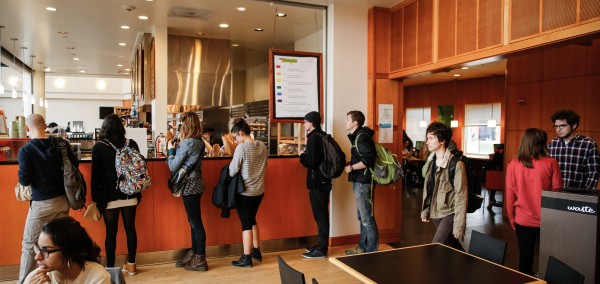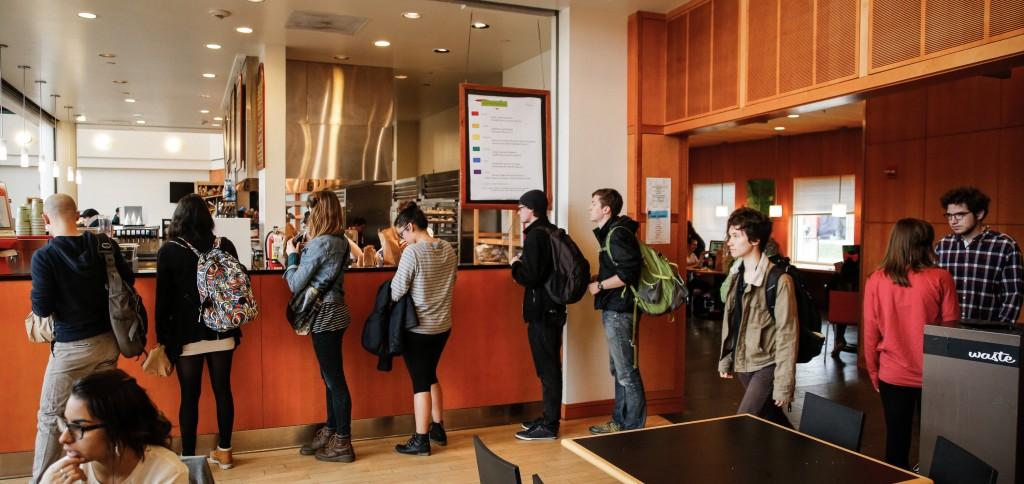When Grinnell reopens for students in fall 2014, students can anticipate a revamped dining program that offers greater variety and accessibility for students. Some of the main changes will be the removal of the Outtakes service, extension of dining hall hours and the addition of reusable “to-go” boxes in place of Outtakes.
As of next semester, the dining hall will be open continuously from 7 a.m. to 8 p.m. Monday through Thursday and 7 a.m. to 7 p.m. on Friday so that students can use their P-Card swipes to eat or take food to-go from the dining hall. Weekend dining hours will remain the same. In addition, Grinnell’s Dining Services will end the Outtakes program, which has struggled to keep up with high demand and staff shortages.
Instead, Dining Services will alternate between full meals with multiple station options during standard dining hours and lighter services with only a few stations between meal times. The new system will also allow students to opt to replace their meal with a “to-go” box and remove food from the dining hall.
Additionally, students will have unlimited daily access to the dining hall under the new program. Instead of being limited to only three meals per day, students will be able to use as many swipes as they choose per day, while the total number of meals available per student per week will be dependent on individual student dining plans, as they are now.

Photo by Frank Zhu.
“This will give students the option to decide how they want to use their meals for the week,” said Director of Dining Services Dick Williams. “We think that this will give the student a sense of value, that now [they] don’t have to worry about losing any of their meals and can plan ahead.”
The decision to restructure dining services has been part of an ongoing discussion, as the Dining Services Committee (DSC) has been discussing these changes for most of the 2013-2014 academic year. Before implementing this change, members of the DSC looked at precedent set by other colleges, which already use similar systems.
“This is not necessarily cutting edge,” Williams said. “This is something that has been in college feeding for some time.”
The decision to change the structure of the meal services came after many consultations with different students, including student leaders, athletes and informal open conversations.
Initially, the Outtakes program was meant to provide a snack to students. But it has grown to become a replacement meal option. One significant factor driving the change to remove the Outtakes program has been the overwhelming popularity of Outtakes, to the point where dining staff could no longer meet the demand.
“We can’t produce enough,” Williams said. “We physically cannot keep up.”
Outtakes currently requires additional staff, preparation time and extra storage to maintain the program, making it more expensive to produce than meals in the dining hall.
Williams also cited the enormous amount of waste that Outtakes generates as being another reason to end the program.
Given this year’s staff shortage in the dining hall, Williams said that the combination of continuous service and the elimination of the current Outtakes program will alleviate some of the current staff shortages and decrease the amount of unnecessary waste produced.
“It might relieve some of the pressure from some of the really busy times that you really have to be staffed up,” Williams said. “Internally [the new program] will allow us to use our staff much more efficiently, and it will relieve a very high stress level on the staff.”
As Outtakes will no longer be available, Dining Services will be providing a new form of meals on the go. Students will be able to enter the dining hall at any time during the day and swipe their P-Cards to obtain reusable containers and cups to take out. Students will be responsible for returning the containers to the dining hall to be reused. Williams hopes that this alternative to Outtakes will be better for the environment and save Grinnell a large amount of money in the meantime.
“[The reusable containers] will help the environment and our green initiative because we will save about 75,000 dollars worth of disposables that we go through at Outtakes,” Williams said.
Besides being more cost-effective and environmentally friendly, Williams said that the new program would offer more options to students, allowing them to make healthier choices.
“This will certainly offer healthier options because you are making the choices yourself,” he added.
Despite some concerns that students have expressed, that keeping the dining hall open may potentially lead to more food waste, Williams said that Dining Services will attempt to alleviate these potential issues when the new program is initiated. Dining staff will take a count of the number of students every 15 minutes and record the peak meal times. Williams says that this allows them to produce enough fresh food during the times of the highest demand and control accordingly.
“We still have the same number of people preparing, the only difference is that we may change the [number of food items produced],” Williams said. “Even though we are open continuously, we will know what the peak times are.”
The cost of student meal plans will increase slightly due to the regular comprehensive fee increase in tuition, room and board. This increase will provide for some of these changes. However, Williams states that this new program would have been made regardless because of the cuts in costs it would eventually provide to Dining Services.
“If the Board of Trustees had said, ‘We’re not going to raise [the comprehensive fee] this year,’ we still would have moved to this type of program,” Williams said.
However, the plans for next year still need to be finalized and Williams said that Dining Services will be working hard over the summer to develop all the specific logistical aspects. Nonetheless, Williams is confident that the new system will better meet the needs of Grinnell’s students.
“We may tweak the times a little but right now, this is what we are thinking of,” William said. “I’m really excited to be able to offer the enhancements to the program. I think it will meet the students’ daily schedule a little better [and] provide more options. I don’t see any negatives about that.”
The current schedule in place for meals next year starts with a hot breakfast, served from 7 a.m. to 10 a.m., which provides students access to all the normal breakfast venues. From 10 a.m. to 11 a.m., a continental breakfast will be served. Lunch will be held from 11 a.m. to 1 p.m. as it is now and a light lunch will be available between 1 p.m. and 5 p.m. Dinner will be served at the usual time between 5 p.m. and 8 p.m. on Monday through Thursday and until 7 p.m. on Friday.


































































